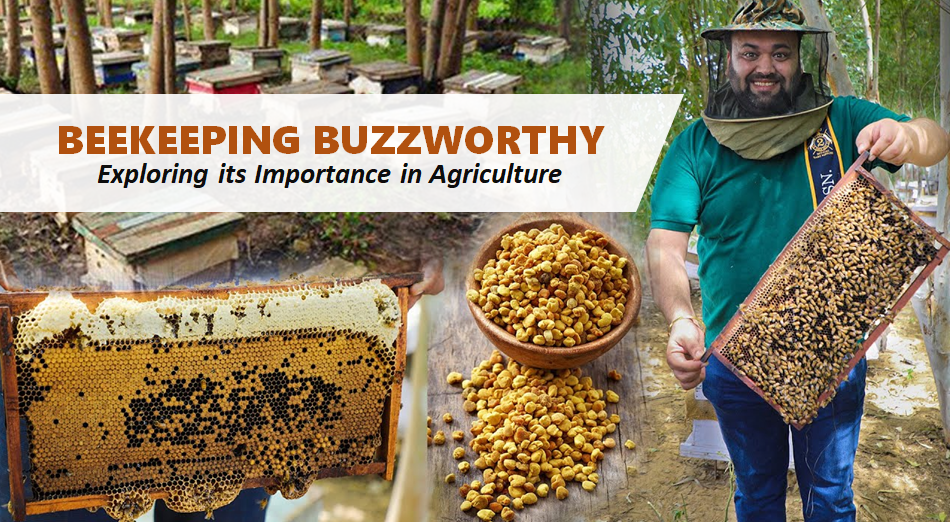Home » Why is Beekeeping a Hot Topic in Agriculture? Exploring its Relevance

Bees. Those miniature marvels that flit from flower to flower, gathering pollen and buzzing with industrious energy. They’re not just adorable pollinators; they’re the unsung heroes of agriculture, playing a vital role in securing our food supply. In this blog post, we’ll delve into the fascinating world of beekeeping and explore its critical importance in the agricultural landscape.
Imagine a world without bees. Fruit trees wouldn’t blossom, vegetables wouldn’t set fruit, and entire ecosystems would teeter on the brink of collapse. That’s because bees are the masterminds of pollination, the process by which pollen is transferred from one flower to another, enabling fertilization and fruit production. In fact, bees are responsible for pollinating roughly one-third of the world’s crops, including apples, berries, melons, almonds, and coffee. Without their diligent work, our dinner plates would look a lot less colorful and a lot less nutritious.
While honey is a delicious byproduct of beekeeping, it’s not the only benefit. By maintaining healthy bee populations, farmers reap a bounty of advantages:
The benefits of beekeeping extend beyond the farm. Bees play a crucial role in maintaining healthy ecosystems by:
Unfortunately, bee populations face numerous threats, including habitat loss, pesticide use, and climate change. This decline in bee numbers poses a serious threat to global food security and ecosystem health. However, there is hope! By practicing sustainable agriculture, supporting local beekeepers, and raising awareness about the importance of bees, we can all contribute to safeguarding these vital pollinators for future generations.
Remember, every action, big or small, can make a difference. By working together, we can ensure that the buzz of bees continues to fill our fields, orchards, and hearts for generations to come.
Let’s all do our part to keep the bees buzzing – and our plates full!
Dr. Ravi Prakash Mishra
Asso. Prof./ Head
School of Agriculture
Lingaya’s Vidyapeeth
At Lingaya’s Vidyapeeth is Best College in Delhi NCR for Agriculture, we offer an innovative agriculture program aimed at enhancing skills and providing practical experience in both natural and modern farming techniques. Our curriculum includes specialized training in beekeeping and livestock management, ensuring students gain a comprehensive understanding of sustainable agricultural practices. With a focus on hands-on learning, our B.Sc in Agriculture Program prepares individuals to excel in the dynamic field of agriculture, fostering both skill development and real-world expertise.
March 13, 2024
RECENT POSTS
CATEGORIES
TAGS
Agriculture Agriculture future AI Architecture artificial intelligence BA English BA Psychology BTech CSE BTech Engineering Business management career Career-Specific Education career guide Career Opportunities career option career scope Civil engineering commerce and management Computer Science Computer science engineering Data science degree education Engineering Engineering students English Literature english program Exam tips Fashion Design Fashion design course Higher Education Journalism journalism and mass communication law Law career Machine Learning MA Psychology Master degree mathematics MBA Mechanical Engineering Pharmacy Psychology Research and Development students
University Address: Nachauli, Jasana Road, Faridabad, Haryana
Toll Free: 1800-120-4613
Mobile : 8447744303 | 8447744304 | 8447744306 | 8447744309
Address: C-72, Second Floor, Shivalik, Near Malviya Nagar,
Above HDFC Bank, New Delhi 110017
Ph.No. - 011-46570515 / 45138169 / 41755703 / +91-7303152412
Jagmani Kutir, Ground Floor, Road No-1, Rajeev Nagar,
Near Darbar Marriage Hall, Patna-800024, Bihar
Contact No: 9818352069/8130120095
Mail: [email protected]
Copyrights © 1998 - 2025 Lingaya's Vidyapeeth (Deemed To Be University). All rights reserved.
It is important to note that the following email IDs and domains are fraudulent and do not belong to our university.
LV only conducts physical/online verification of any document related to examination on the following email id: